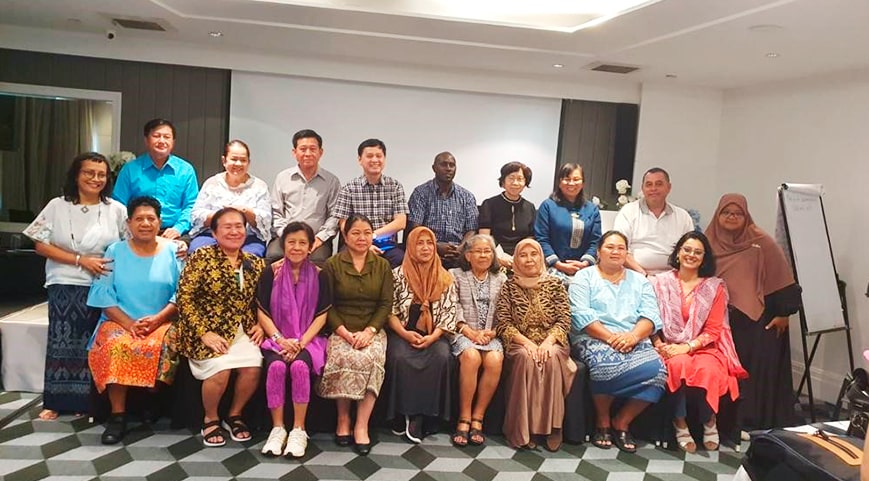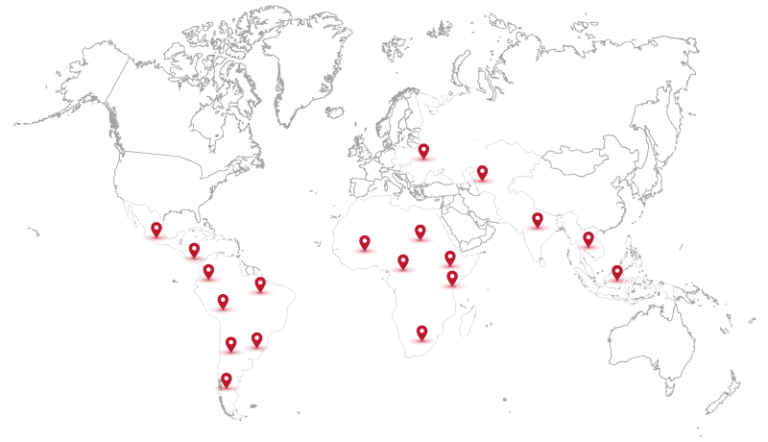By: Aurora Sevilla, WIEGO
Homenet Southeast Asia together with Women in Informal Employment Globalizing and Organizing (WIEGO) convened a hybrid consultation workshop focusing on Social Dialogue on Social Protection for Workers in the Informal Economy in ASEAN March 22 in Bangkok, Thailand.
It was a breakthrough consultation with speakers from the International Labor Organization (ILO) and the Association of Southeast Asian Nations (ASEAN); officials from the national governments of Cambodia, Indonesia and Thailand, leaders of trade unions and international NGOs; as well as representatives of membership-based organizations of workers in the informal economy from six country homenets within the ASEAN region.
The social dialogue provided a platform to articulate and highlight the recent efforts, and existing gaps in expanding the social protection coverage for workers in the informal economy in Southeast Asia. Attended by more than 70 participants (45 in person and 25 online) representing ASEAN Senior Labour Officials Meeting (SLOM), trade unions, membership-based organizations (MBOs) of informal economy workers, civil society organizations, and international organizations, this first hybrid regional workshop organized by Women in Informal Employment: Globalizing and Organizing (WIEGO) and HomeNet Southeast Asia served as a venue to learn from recent initiatives by some ASEAN Member States and hear the social protection needs from the informal economy workers.
Yuki Otsuji, ILO Specialist in Workers Activities described social security/social protection as a set of policies and programs designed to reduce and prevent poverty and vulnerability across the life cycle and emphasized the importance of social dialogue and consultations with partners for devising coordinated policy responses through increased representation of workers’ organizations in advancing social protection. Director Rhodora Babaran of the ASEAN Secretariat on Human Development gave a brief update on the key recommendations from the 4 December 2020 conference led by Viet Nam.
According to the International Labour Organization, the Covid-19 pandemic has exposed deep-seated inequalities and significant gaps in social protection coverage, comprehensiveness, and adequacy across all regions and countries.
Across Asia and the Pacific, only 44.1% of the population is effectively covered by at least one social security cash benefit. The huge underinvestment in social protection in the region continues to prevail while a number of barriers hinder the extension of social protection.
ASEAN has the 5th largest economy globally, with a $3 trillion GDP in 2020, however, the rate of informal employment in the ASEAN Member States remains high and also prevalent in non-agriculture informal economies. The region also faces challenges of increasing informal workers amidst the digitalization of the ASEAN economies. It has an estimated 244 million workers are in informal employment
Ouk Samon, Director of Customer Services and Public Relations Department of the national Social Security Fund of Cambodia; Erlys Fera Hutanti from the Office for the Prevention of Discrimination in terms of Employment; Ministry of Manpower of Indonesia; and Navin Tharaswang, Director of Informal Workers, Policy Office, Ministry of Labour, Thailand Officials from ASEAN countries shared initiatives and enduring challenges in social protection.
- In Thailand, extending social protection is part of the Informal Workers Administration Plan (2023-2027). A draft bill is also underway that aims to promote the rights of own-account workers. The government is now gearing toward the promotion of the Informal Worker Registration System.
- In Indonesia, among the recent initiatives of the government include providing pension security for informal workers (still in the discussion stage), establishing contribution or subsidy assistance schemes for vulnerable and poor informal workers, embracing more Informal workers in order to have social protection
- In Cambodia, the National Social Security Fund (NSSF) has launched the pilot project of health care for the self-employed, which will now enable voluntary self-employed contributors to access health care benefits such as medical care services and maternity allowance.
Representatives from organizations concerned with subsectors of workers in the informal economy (home- based workers , migrant workers , domestic workers and street vendors) shared the needs and challenges they are confronted with as they engaged in social dialogue.
Representatives from organizations concerned with subsectors of workers in the informal economy (home- based workers , migrant workers , domestic workers and street vendors) shared the needs and challenges they are confronted with as they engaged in social dialogue.
Migrant workers in Vietnam: Most of the domestic workers in Vietnam are internal migrants and they primarily need access to health and social insurance benefits. While this is already stated in the law, according to the survey of MNET (Migration Network) on domestic workers, around 70% have health insurance already but the coverage for social insurance is still limited. (Dr. Le Van Son, MNET-LIGHT Vietnam)
Domestic workers in the Philippines: Domestic workers need access to health care including maternity benefits (i.e expanded maternity leave) and improved health facilities; housing for domestic workers since most of them come from the provinces; access to education so they can do beyond domestic work; unemployment insurance; and pension and retirement benefits. (Himaya Montenegro, International Domestic Workers Federation)
Street vendors in Cambodia: Street vendors need free health insurance. However, in Cambodia, only those targeted in the IDPoor Programme received free health insurance. They also need childcare so street vendors don’t need to bring along their children on the streets. (Phoeun Kao, Independent Democratic Association of Informal Economy, Cambodia)
Home-based workers in Lao PDR: Home-based workers want to reduce the current 9% premium contributions of minimum wage because home-based workers usually have a low and seasonal income. They also want to increase the benefits received under the social insurance similar to what the private employees receive, improve the health benefits, and make it accessible to those living at the district level. (Lamphan Nanthapanya HomeNet Laos)
As a way forward, ILO highlighted that extending access to social protection for informal workers is needed whilst supporting the transition from the informal to the formal economy and must be considered within a broader agenda for decent work, including tackling precarious and non-standard forms of work and ensuring living wages.
The dialogue culminated with workshops which involved (a) representatives of membership-based organizations; b) leaders of trade unions and international NGOs; and c) government officials.
The following are the consolidated responses:
- Mapping of existing mechanisms/frameworks:
- Mapping of existing mechanisms/frameworks:
- Country practices in promoting access of informal workers to social dialogue mechanisms
- Current social dialogue mechanisms in ASEAN as regional body
- Current informal ways or channels where informal workers for social dialogue in (a) respective national government; (b) regional or international
- Transboundary arrangements between countries of origin and destination
- Prospective mechanisms/frameworks on social dialogue:
- What would be the best mechanisms for social dialogues between workers in the informal economy and government
- What mechanism can improve coordination and collaboration between social partners and government
- How to unite the forces of workers in the informal economy, in multipolar-multicrisis world
- Further understanding of social protection for workers in the informal economy
- Designing inclusive social insurance
- Good practices from other countries on extending social protection
- Putting ASEAN Declaration in practice
The research methodology participants mostly identified are action-oriented dialogue which includes key informant interviews or structured surveys with informal workers organizations, governments, and the ASEAN. At the same time, focus group discussion may help to triangulate the information gathered from the interviews.
Finally, according to participants, the said proposed research can serve as a guide for the government, informal workers, and the ASEAN in promoting the access of the informal workers to social dialogue mechanisms and social protection. Particularly, this research can help inform policymakers and relevant international organisations/donor countries that support policy development and implementation in ASEAN. The research findings can also be transformed into an easily accessible format to ordinary people in ASEAN to let them know their rights to social protection. The outcome should be seen as a multistakeholder contribution (SDG 17) to realizing the ASEAN declaration on social protection. The research findings can also be disseminated through ASEAN forums, whether government-organised or civil society, online media, and publication.





